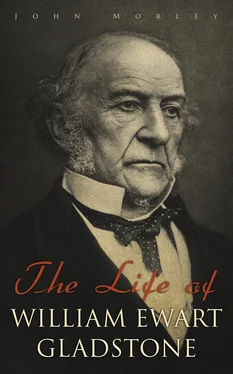POSITION OF LORD ABERDEEN
This statement, the first memorable Letter to Lord Aberdeen, was ready at the beginning of April. The old minister gave it 'mature consideration' for the best part of a month. His antecedents made him cautious. Mr. Gladstone, ten years later, admitted that Lord Aberdeen's views of Italy did not harmonise with what was his general mode of estimating human action and the world's affairs, and there was a reason for this in his past career. In very early youth he had been called upon to deal with the gigantic questions that laid their mighty weight upon European statesmen at the fall of Napoleon; the natural effect of this close contact with the vast and formidable problems of 1814-5 was to make him regard the state-system then founded as a structure on which only reckless or criminal unwisdom would dare to lay a finger. The fierce storms of 1848 were not calculated to loosen this fixed idea, or to dispose him to any new views of either the relations of Austria to Italy, or of the uncounted mischiefs to the Peninsula of which those relations were the nourishing and maintaining cause. In a debate in the Lords two years before (July 20, 1849), Lord Aberdeen had sharply criticised the British government of the day for doing the very thing officially, which Mr. Gladstone was now bringing moral compulsion on him to attempt unofficially. Lord Palmerston had called attention at Vienna to the crying evils of the government of Naples, and had boldly said that it was little wonder if men groaning for long years under such grievances and seeing no hope of redress, should take up any scheme, however wild, that held out any chance of relief. This and other proceedings indicating unfriendliness to the King of Naples and a veiled sympathy with rebellion shocked Aberdeen as much as Lamartine's trenchant saying that the treaties of Vienna were effete. In attacking Palmerston's foreign policy again in 1850, he protested that we had deeply injured Austria and had represented her operations in Italy in a completely false light. In his speech in the Pacifico debate, he had referred to the Neapolitan government without approval but in guarded phrases, and had urged as against Lord Palmerston that the less they admired Neapolitan institutions and usages, the more careful ought they to be not to impair the application of the sacred principles that govern and harmonise the intercourse between states, from which you never can depart without producing mischiefs a thousand fold greater than any promised advantage. Aberdeen was too upright and deeply humane a man to resist the dreadful evidence that was now forced upon him. Still that evidence plainly shook down his own case of a few months earlier, and this cannot have been pleasing. He felt the truth and the enormity of the indictment laid before him; he saw the prejudice that would inevitably be done to conservatism both at home and on the European continent, by the publication of such an indictment from the lips of such a pleader; and he perceived from Mr. Gladstone's demeanour that the decorous plausibilities of diplomacy would no more hold him back from resolute exposure, than they would put out the fires of Vesuvius or Etna.
On May 2 Lord Aberdeen wrote to Schwarzenberg at Vienna, saying that for forty years he had been connected with the Austrian government, and taken a warm interest in the fortunes of the empire; that Mr. Gladstone, one of the most distinguished members of the cabinet of Peel, had been so shocked by what he saw at Naples, that he was resolved to make some public appeal; that to avoid the pain and scandal of a conservative statesman taking such a course, would not his highness use his powerful influence to get done at Naples all that could reasonably be desired? The Austrian minister replied several weeks after (June 30). If he had been invited, he said, officially to interfere he would have declined; as it was, he would bring Mr. Gladstone's statements to the notice of his Sicilian majesty. Meanwhile, at great length, he reminded Lord Aberdeen that a political offender may be the worst of all offenders, and argued that the rigour exercised by England herself in the Ionian Islands, in Ceylon, in respect of Irishmen, and in the recent case of Ernest Jones, showed how careful she should be in taking up abroad the cause of bad men posing as martyrs in the holy cause of liberty.
During all these weeks, while Aberdeen was maturely considering, and while Prince Schwarzenberg was making his secretaries hunt up recriminatory cases against England, Mr. Gladstone was growing impatient. Lord Aberdeen begged him to give the Austrian minister a little more time. It was nearly four months since Mr. Gladstone landed at Dover, and every day he thought of Poerio, Settembrini, and the rest, wearing their double chains, subsisting on their foul soup, degraded by forced companionship with criminals, cut off from the light of heaven, and festering in their dungeons. The facts that escaped from him in private conversation seemed to him—so he tells Lacaita—to spread like wildfire from man to man, exciting the liveliest interest, and extending to the highest persons in the land. He waited a fortnight more, then at the beginning of July he launched his thunderbolt, publishing his Letter to Lord Aberdeen, followed by a second explanation and enlargement a fortnight later. 243He did not obtain formal leave from Lord Aberdeen for the publication, but from their conversation took it for granted.
NEAPOLITAN LETTERS PUBLISHED
The sensation was profound, and not in England only. The Letters were translated into various tongues and had a large circulation. The Society of the Friends of Italy in London, the disciples of Mazzini (and a high-hearted band they were), besought him to become a member. Exiles wrote him letters of gratitude and hope, with all the moving accent of revolutionary illusion. Italian women composed fervid odes in fire and tears to the ' generoso britanno ,' the ' magnanimo cor ,' the ' difensore d'un popolo gemente .' The press in this country took the matter up with the warmth that might have been expected. The character and the politics of the accuser added invincible force to his accusations, and for the first time in his life Mr. Gladstone found himself vehemently applauded in liberal prints. Even the contemporary excitement of English public feeling against the Roman catholic church fed the flame. It was pointed out that the King of Naples was the bosom friend of the pope, and that the infernal system described by Mr. Gladstone was that which the Roman clergy regarded as normal and complete. 244Mr. Gladstone had denounced as one of the most detestable books he ever read a certain catechism used in the Neapolitan schools. Why then, cried the Times , does he omit all comment on the church which is the main and direct agent in this atrocious instruction? The clergy had either basely accepted from the government doctrines that they were bound to abhor, or else these doctrines were their own. And so things glided easily round to Dr. Cullen and the Irish education question. This line was none the less natural from the fact that the editor of the Univers , the chief catholic organ in France, made himself the foremost champion of the Neapolitan policy. The Letters delighted the Paris Reds. They regarded their own epithets as insipid by comparison with the ferocious adjectives of the English conservative. On the other hand, an English gentleman was blackballed at one of the fashionable clubs in Paris for no better reason than that he bore the name of Gladstone. For European conservatives read the letters with disgust and apprehension. People like Madame de Lieven pronounced Mr. Gladstone the dupe of men less honest than himself, and declared that he had injured the good cause and discredited his own fame, besides doing Lord Aberdeen the wrong of setting his name at the head of a detestable libel. The illustrious Guizot wrote Mr. Gladstone a long letter expressing, with much courtesy and kindness, his regret at the publication. Nothing is left in Italy, said Guizot, between the terrors of governments attacked in their very existence and the fury of the beaten revolutionists with hopes more alert than ever for destruction and chaos. The King of Naples on one side, Mazzini on the other; such, said Guizot, is Italy. Between the King of Naples and Mazzini, he for one did not hesitate. This was Mr. Gladstone's first contact with the European party of order in the middle of the century. Guizot was a great man, but '48 had perverted his generalising intellect, and everywhere his jaundiced vision perceived in progress a struggle for life and death with 'the revolutionary spirit, blind, chimerical, insatiate, impracticable.' He avowed his own failure when he was at the head of the French government, to induce the rulers of Italy to make reforms; and now the answer of Schwarzenberg to Lord Aberdeen, as well as the official communications from Naples, showed that like Guizot's French policy the Austrian remedy was moonshine.
Читать дальше









![William Frith - John Leech, His Life and Work. Vol. 1 [of 2]](/books/747171/william-frith-john-leech-his-life-and-work-vol-thumb.webp)


![William Frith - John Leech, His Life and Work, Vol. 2 [of 2]](/books/748201/william-frith-john-leech-his-life-and-work-vol-thumb.webp)